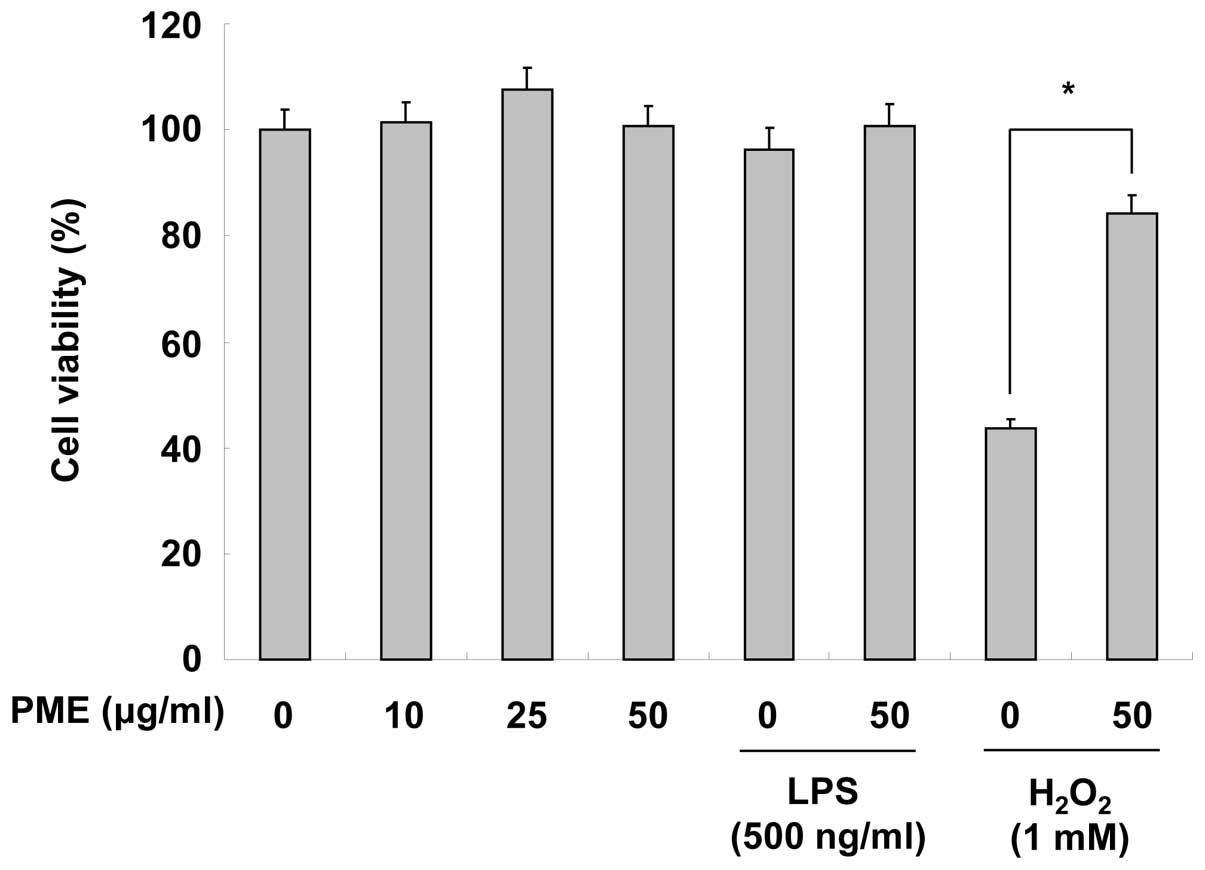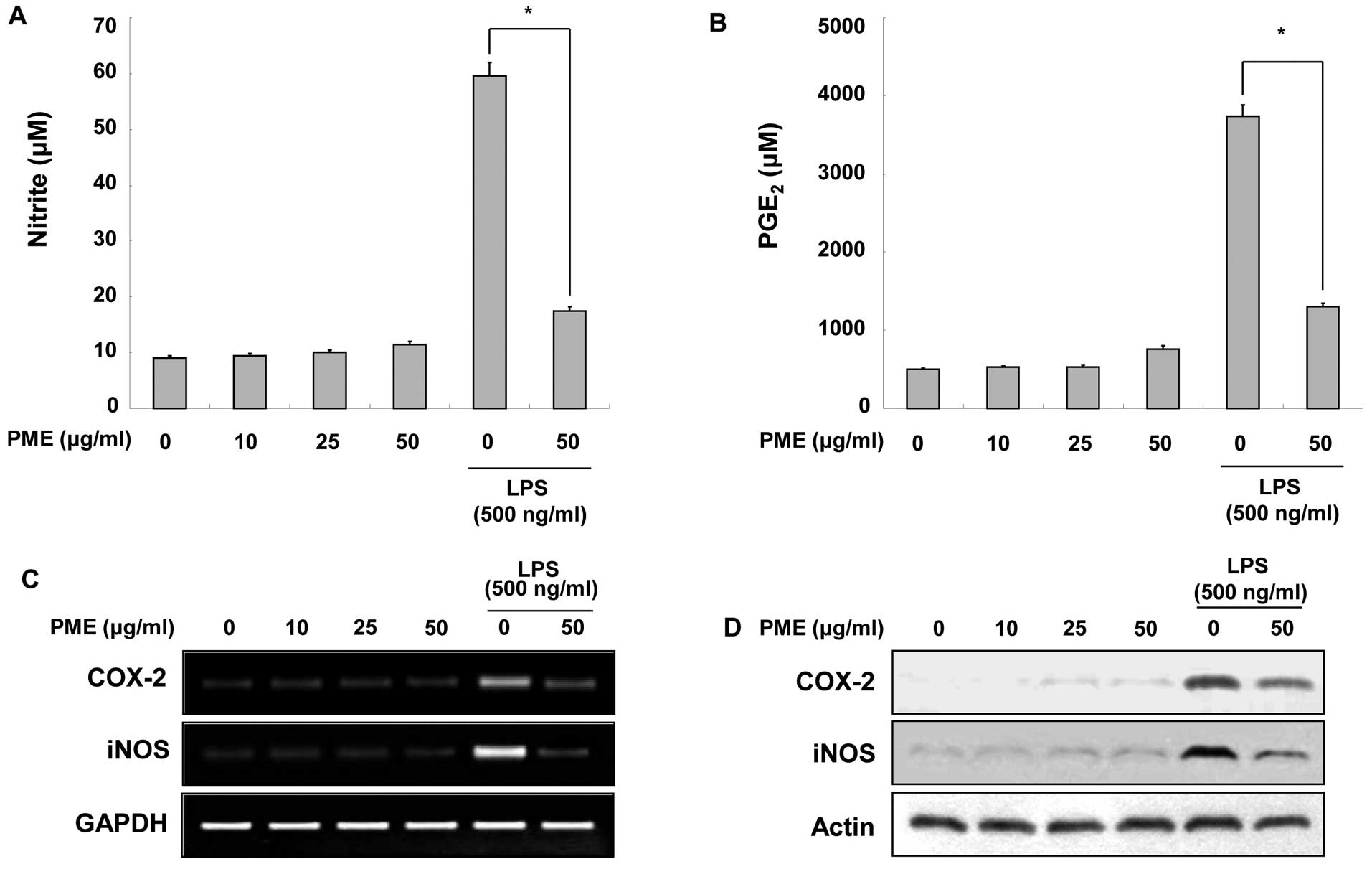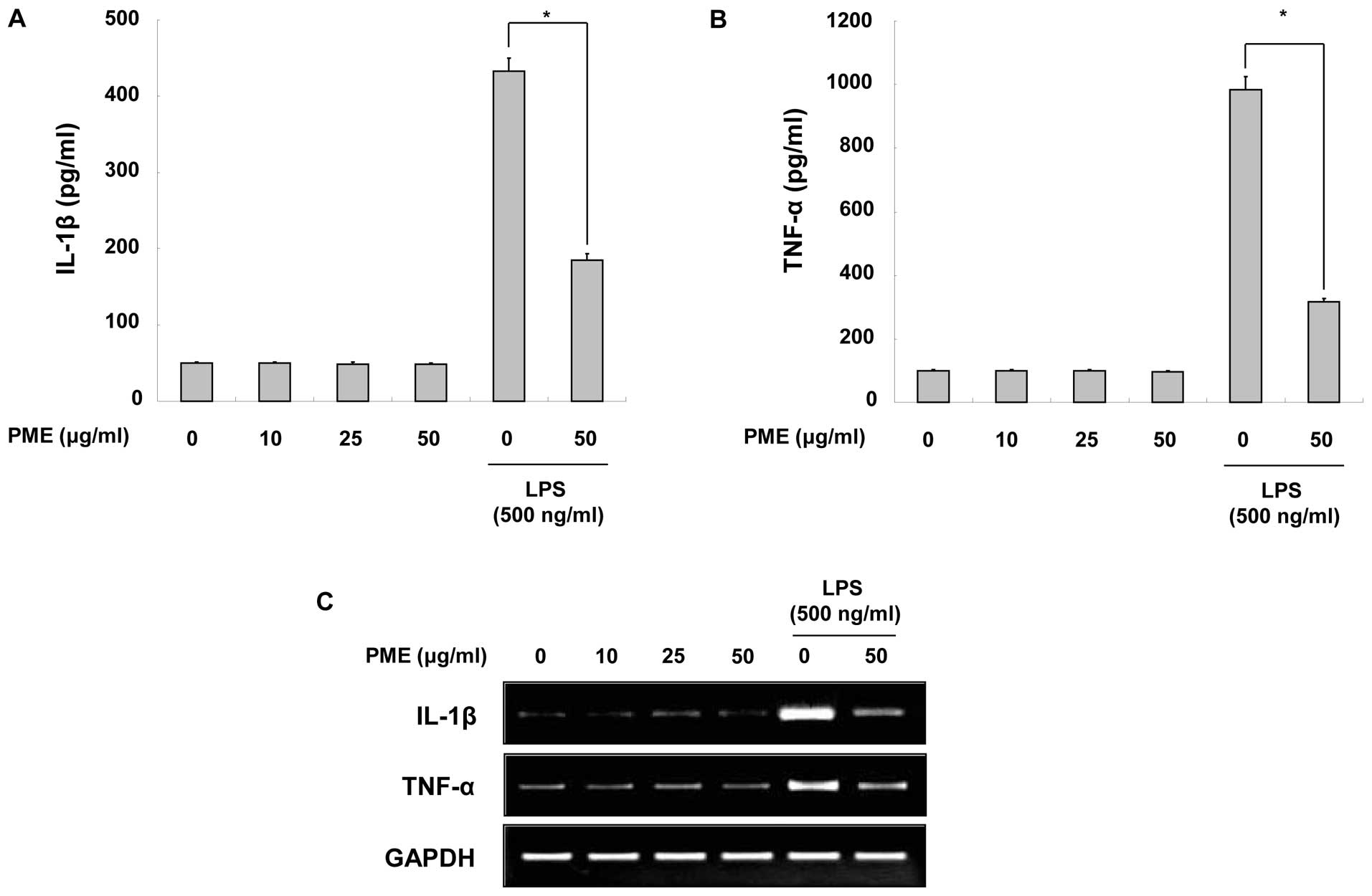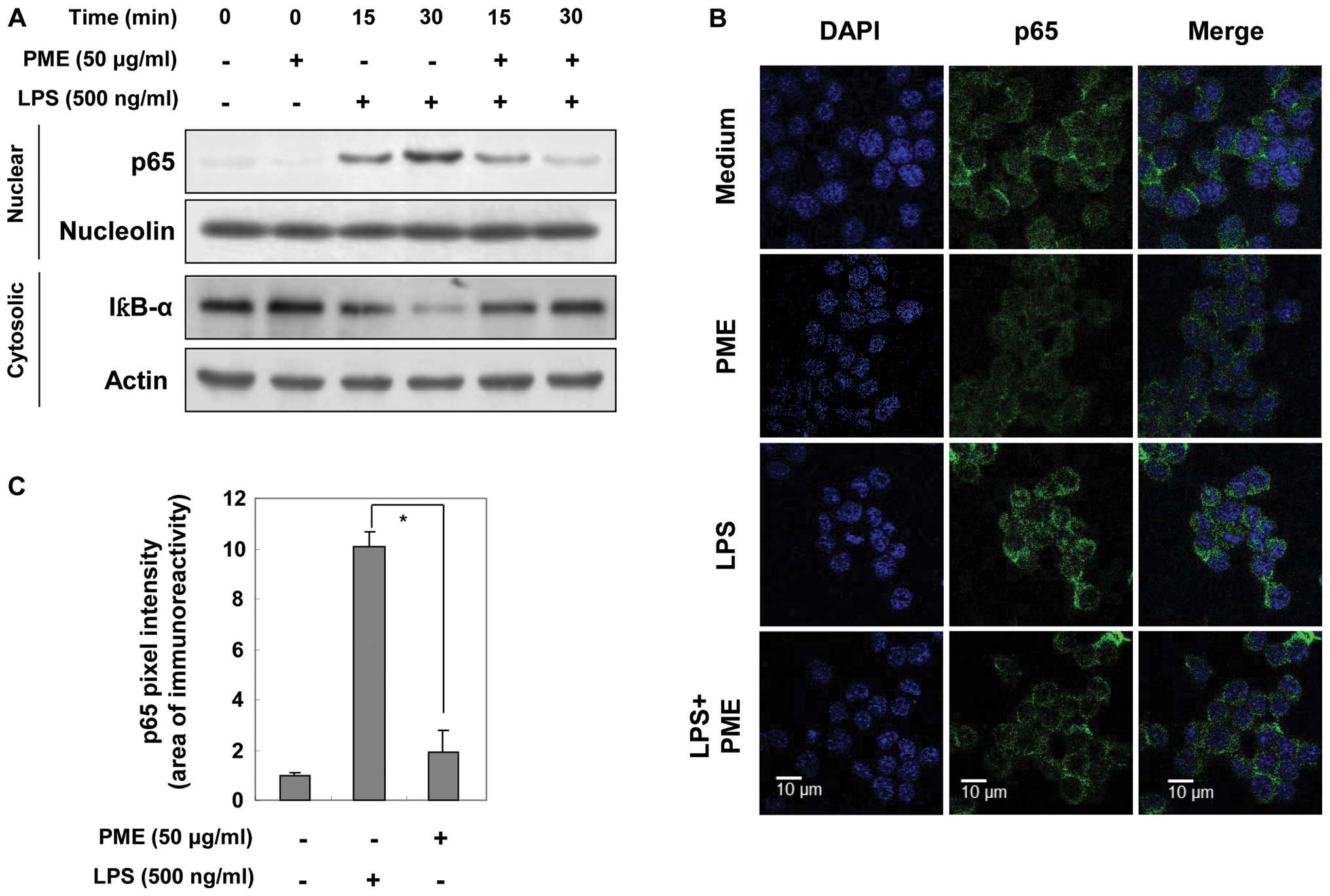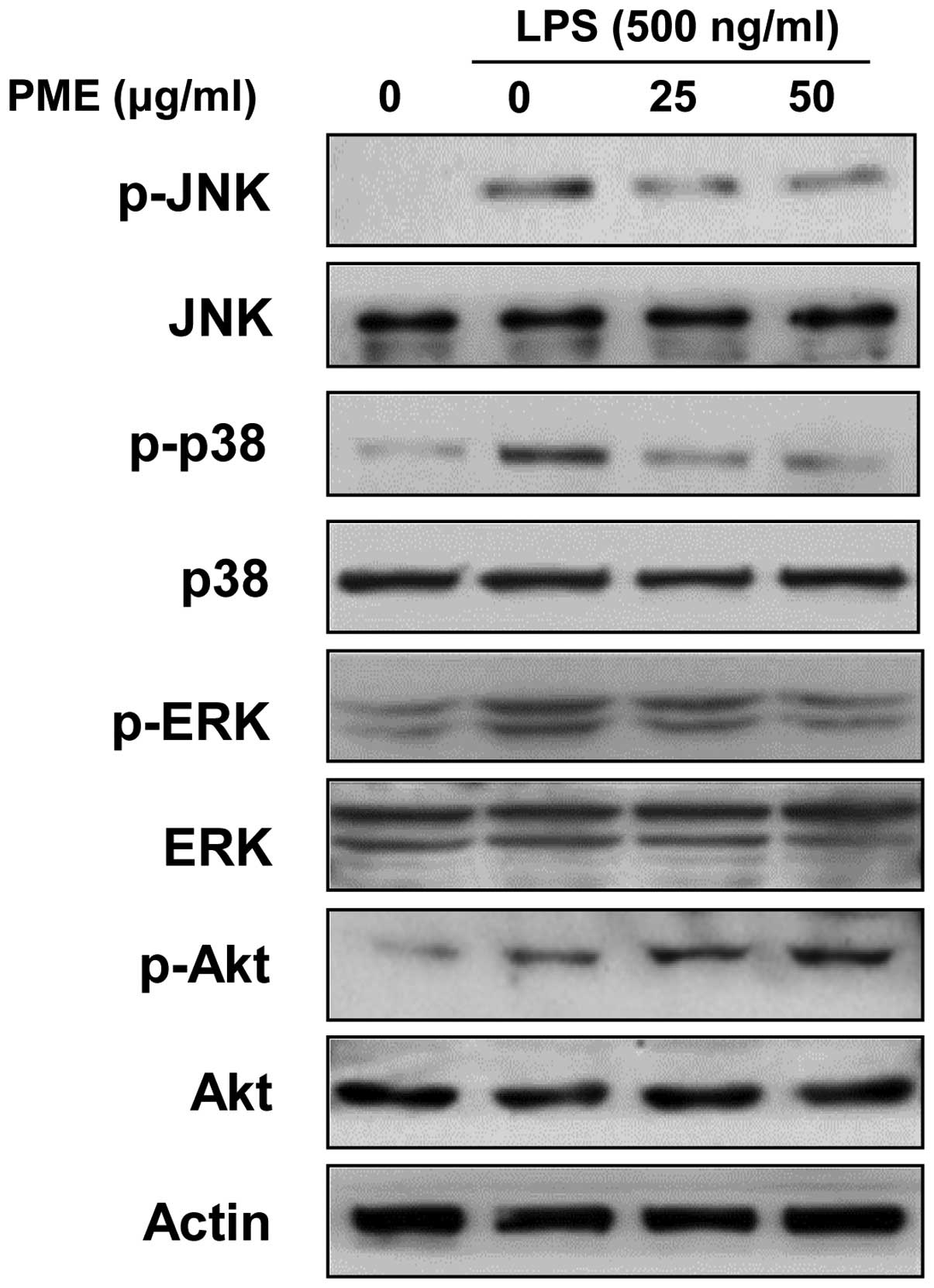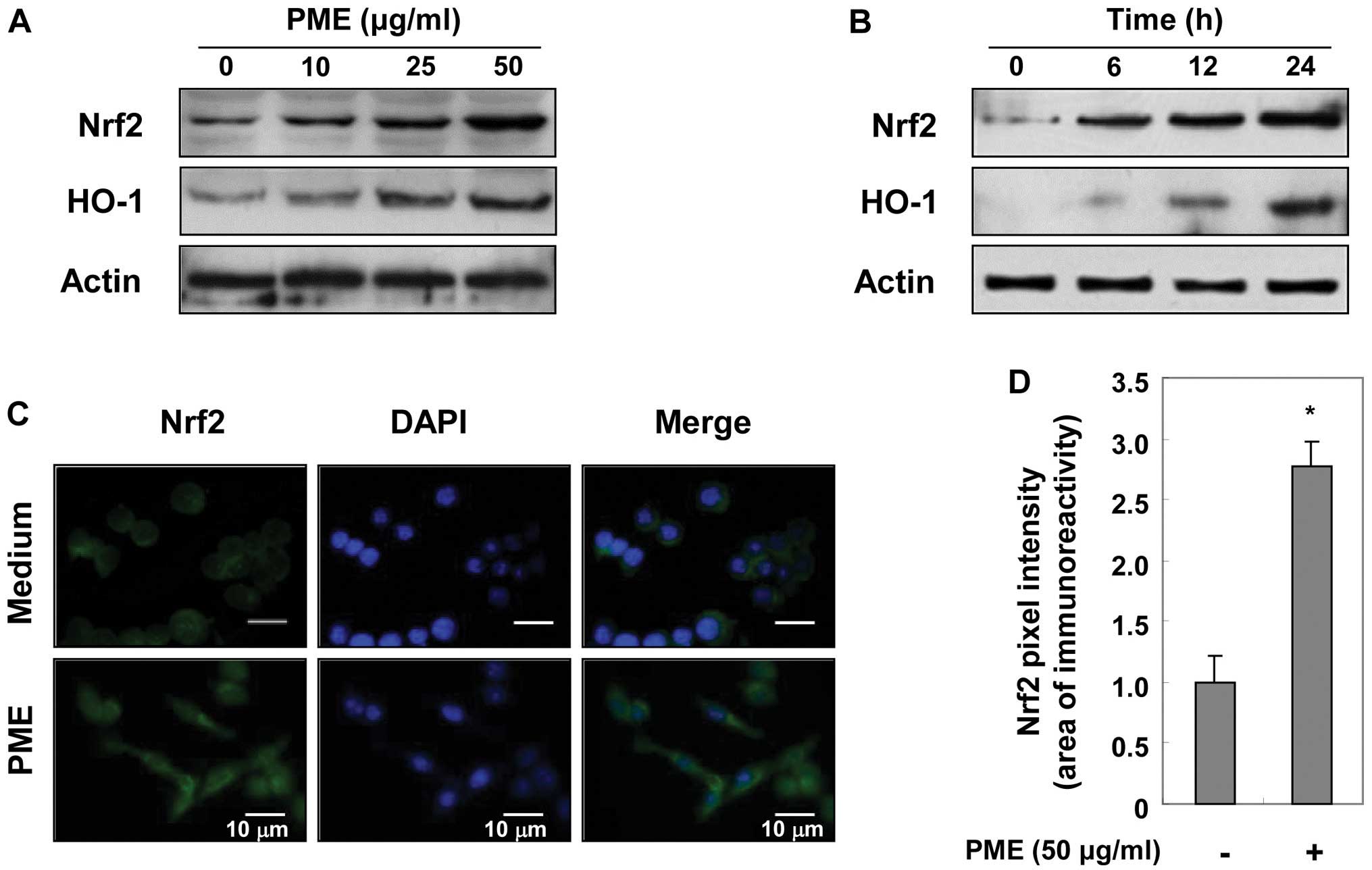|
1
|
Medzhitov R: Inflammation 2010: new
adventures of an old flame. Cell. 140:771–776. 2010. View Article : Google Scholar : PubMed/NCBI
|
|
2
|
Jaffrey SR and Snyder SH: Nitric oxide: a
neural messenger. Annu Rev Cell Dev Biol. 11:417–440. 1995.
View Article : Google Scholar : PubMed/NCBI
|
|
3
|
Won JS, Im YB, Singh AK and Singh I: Dual
role of cAMP in iNOS expression in glial cells and macrophages is
mediated by differential regulation of p38-MAPK/ATF-2 activation
and iNOS stability. Free Radic Biol Med. 37:1834–1844. 2004.
View Article : Google Scholar : PubMed/NCBI
|
|
4
|
Hu C and Kitts DD: Luteolin and
luteolin-7-O-glucoside from dandelion flower suppress iNOS and
COX-2 in RAW264. 7 cells. Mol Cell Biochem. 265:107–113. 2004.
View Article : Google Scholar : PubMed/NCBI
|
|
5
|
Salvemini D, Misko TP, Masferrer JL,
Seibert K, Currie MG and Needleman P: Nitric oxide activates
cyclooxygenase enzymes. Proc Natl Acad Sci USA. 90:7240–7244. 1993.
View Article : Google Scholar : PubMed/NCBI
|
|
6
|
Tak PP: A personalized medicine approach
to biologic treatment of rheumatoid arthritis: a preliminary
treatment algorithm. Rheumatology. 51:600–609. 2012. View Article : Google Scholar : PubMed/NCBI
|
|
7
|
Ahn JK, Huang B, Bae EK, et al: The role
of α-defensin-1 and related signal transduction mechanisms in the
production of IL-6, IL-8 and MMPs in rheumatoid fibroblast-like
synoviocytes. Rheumatology. 52:1368–1376. 2013.
|
|
8
|
Cocozza C, D’orazio V, Miano T and Shotyk
W: Characterization of solid and aqueous phases of a peat bog
profile using molecular fluorescence spectroscopy, ESR and FT-IR,
and comparison with physical properties. Org Geochem. 34:49–60.
2003. View Article : Google Scholar
|
|
9
|
Bonifacio E, Falsone G and Petrillo M:
Humus forms, organic matter stocks and carbon fractions in forest
soils of northwestern Italy. Biol Fert Soils. 47:555–566. 2011.
View Article : Google Scholar
|
|
10
|
Schepetkin I, Khlebnikov A and Kwon BS:
Medical drugs from humus matter: focus on mumie. Drug Develop Res.
57:140–159. 2002. View Article : Google Scholar
|
|
11
|
Van Rensburg CE, Snyman JR, Mokoele T and
Cromarty AD: Brown coal derived humate inhibits contact
hypersensitivity; an efficacy, toxicity and teratogenicity study in
rats. Inflammation. 30:148–152. 2007.PubMed/NCBI
|
|
12
|
Jooné GK and van Rensburg CE: An in vitro
investigation of the anti-inflammatory properties of potassium
humate. Inflammation. 28:169–174. 2004.PubMed/NCBI
|
|
13
|
Van Rensburg CE and Naude PJ: Potassium
humate inhibits complement activation and the production of
inflammatory cytokines in vitro. Inflammation. 32:270–276.
2009.PubMed/NCBI
|
|
14
|
Ho Y, John Wase D and Forster C: Batch
nickel removal from aqueous solution by sphagnum moss peat. Water
Res. 29:1327–1332. 1995. View Article : Google Scholar
|
|
15
|
Gardea-Torresdey J, Tang L and Salvador J:
Copper adsorption by esterified and unesterified fractions of
Sphagnum peat moss and its different humic substances. J Hazard
Mater. 48:191–206. 1996. View Article : Google Scholar
|
|
16
|
Cormier Y, Israel-Assayag E, Bedard G and
Duchaine C: Hypersensitivity pneumonitis in peat moss processing
plant workers. Am J Respir Crit Care Med. 158:412–417. 1998.
View Article : Google Scholar : PubMed/NCBI
|
|
17
|
Cormier Y, Boulet LP and Bérubé-Genest F:
Effects of chronic organic dust exposure on respiratory function
and airway responsiveness in peat moss factory workers. Arch
Environ Health. 45:20–23. 1990. View Article : Google Scholar : PubMed/NCBI
|
|
18
|
Sakurai H, Kohsaka H, Liu MF, et al:
Nitric oxide production and inducible nitric oxide synthase
expression in inflammatory arthritides. J Clin Invest.
96:2357–2363. 1995. View Article : Google Scholar : PubMed/NCBI
|
|
19
|
Abd-El-Aleem SA, Ferguson MW, Appleton I,
Bhowmick A, McCollum CN and Ireland GW: Expression of
cyclooxygenase isoforms in normal human skin and chronic venous
ulcers. J Pathol. 195:616–623. 2001. View
Article : Google Scholar : PubMed/NCBI
|
|
20
|
Gayathri B, Manjula N, Vinaykumar K,
Lakshmi B and Balakrishnan A: Pure compound from Boswellia
serrata extract exhibits anti-inflammatory property in human
PBMCs and mouse macrophages through inhibition of TNFα, IL-1β, NO
and MAP kinases. Int Immunopharmacol. 7:473–482. 2007.
|
|
21
|
Dayer JM: The process of identifying and
understanding cytokines: from basic studies to treating rheumatic
diseases. Best Pract Res Clin Rheumatol. 18:31–45. 2004. View Article : Google Scholar : PubMed/NCBI
|
|
22
|
Lefkowitz DL, Mills K, Lefkowitz S, Bollen
A and Moguilevsky N: Neutrophil-macrophage interaction: a paradigm
for chronic inflammation. Med Hypotheses. 44:58–62. 1995.
View Article : Google Scholar : PubMed/NCBI
|
|
23
|
Naudé P, Cromarty AD and van Rensburg CE:
Potassium humate inhibits carrageenan-induced paw oedema and a
graft-versus-host reaction in rats. Inflammopharmacology. 18:33–39.
2010.PubMed/NCBI
|
|
24
|
Neurath M, Becker C and Barbulescu K: Role
of NF-κB in immune and inflammatory responses in the gut. Gut.
43:856–860. 1998.
|
|
25
|
Schmedtje JF, Ji YS, Liu WL, DuBois RN and
Runge MS: Hypoxia induces cyclooxygenase-2 via the NF-κB p65
transcription factor in human vascular endothelial cells. J Biol
Chem. 272:601–608. 1997.
|
|
26
|
O’Neill LA and Kaltschmidt C: NF-κB: a
crucial transcription factor for glial and neuronal cell function.
Trends Neurosci. 20:252–258. 1997.
|
|
27
|
Robinson MJ and Cobb MH: Mitogen-activated
protein kinase pathways. Curr Opin Cell Biol. 9:180–186. 1997.
View Article : Google Scholar : PubMed/NCBI
|
|
28
|
Cobb MH and Goldsmith EJ: How MAP kinases
are regulated. J Biol Chem. 270:14843–14846. 1995. View Article : Google Scholar : PubMed/NCBI
|
|
29
|
Caivano M and Cohen P: Role of
mitogen-activated protein kinase cascades in mediating
lipopolysaccharide-stimulated induction of cyclooxygenase-2 and
IL-1β in RAW264 macrophages. J Immunol. 164:3018–3025.
2000.PubMed/NCBI
|
|
30
|
Chan ED and Riches DW: IFN-γ+
LPS induction of iNOS is modulated by ERK, JNK/SAPK, and p38 mapk
in a mouse macrophage cell line. Am J Physiol Cell Physiol.
280:C441–C450. 2001.
|
|
31
|
Rajaram MV, Ganesan LP, Parsa KV, Butchar
JP, Gunn JS and Tridandapani S: Akt/protein kinase B modulates
macrophage inflammatory Response to Francisella infection
and confers a survival advantage in mice. J Immunol. 177:6317–6324.
2006. View Article : Google Scholar : PubMed/NCBI
|
|
32
|
Zhang WJ, Wei H, Hagen T and Frei B:
α-lipoic acid attenuates LPS-induced inflammatory responses by
activating the phosphoinositide 3-kinase/Akt signaling pathway.
Proc Natl Acad Sci USA. 104:4077–4082. 2007.
|
|
33
|
Zong Y, Sun L, Liu B, Deng YS, Zhan D,
Chen YL, He Y, Liu J, Zhang ZJ, Sun J and Lu D: Resveratrol
inhibits LPS-induced MAPKs activation via activation of the
phosphatidylinositol 3-kinase pathway in murine RAW 264.7
macrophage cells. PLoS One. 7:e441072012. View Article : Google Scholar : PubMed/NCBI
|
|
34
|
Bognar E, Sarszegi Z, Szabo A, Debreceni
B, Kalman N, Tucsek Z, Sumegi B and Gallyas F Jr: Antioxidant and
anti-inflammatory effects in RAW 264.7 macrophages of malvidin, a
major red wine polyphenol. PLoS One. 8:e653552013. View Article : Google Scholar : PubMed/NCBI
|
|
35
|
Wang L, Chen Y, Sternberg P and Cai J:
Essential roles of the PI3 kinase/Akt pathway in regulating
Nrf2-dependent antioxidant functions in the RPE. Inverst Ophthalmol
Vis Sci. 49:1671–1678. 2008. View Article : Google Scholar : PubMed/NCBI
|
|
36
|
Zou W, Chen C, Zhong Y, An J, Zhang X, Yu
Y, Yu Z and Fu J: PI3K/Akt pathway mediates Nrf2/ARE activation in
human L02 hepatocytes exposed to low-concentration HBCDs. Environ
Sci Technol. 47:12434–12440. 2013. View Article : Google Scholar : PubMed/NCBI
|
|
37
|
Hoetzel A, Vagts DA, Loop T, et al: Effect
of nitric oxide on shock-induced hepatic heme oxygenase-1
expression in the rat. Hepatology. 33:925–937. 2001. View Article : Google Scholar : PubMed/NCBI
|
|
38
|
Stocker R, Yamamoto Y, McDonagh AF, Glazer
AN and Ames BN: Bilirubin is an antioxidant of possible
physiological importance. Science. 235:1043–1046. 1987. View Article : Google Scholar : PubMed/NCBI
|
|
39
|
Mitani K, Fujita H, Fukuda Y, Kappas A and
Sassa S: The role of inorganic metals and metalloporphyrins in the
induction of haem oxygenase and heat-shock protein 70 in human
hepatoma cells. Biochem J. 290:819–825. 1993.PubMed/NCBI
|
|
40
|
Scapagnini G, Foresti R, Calabrese V,
Stella AG, Green C and Motterlini R: Caffeic acid phenethyl ester
and curcumin: a novel class of heme oxygenase-1 inducers. Mol
Pharmacol. 61:554–561. 2002. View Article : Google Scholar : PubMed/NCBI
|
|
41
|
Motterlini R, Foresti R, Bassi R and Green
CJ: Curcumin, an antioxidant and anti-inflammatory agent, induces
heme oxygenase-1 and protects endothelial cells against oxidative
stress. Free Radic Biol Med. 28:1303–1312. 2000. View Article : Google Scholar : PubMed/NCBI
|
|
42
|
Kobayashi A, Kang MI, Okawa H, et al:
Oxidative stress sensor Keap1 functions as an adaptor for
Cul3-based E3 ligase to regulate proteasomal degradation of Nrf2.
Mol Cell Biol. 24:7130–7139. 2004. View Article : Google Scholar : PubMed/NCBI
|
|
43
|
Itoh K, Mochizuki M, Ishii Y, et al:
Transcription factor Nrf2 regulates inflammation by mediating the
effect of 15-deoxy-Δ12, 14-prostaglandin J2.
Mol Cell Biol. 24:36–45. 2004.PubMed/NCBI
|
|
44
|
Jeon WK, Hong HY and Kim BC: Genipin
up-regulates heme oxygenase-1 via PI3-kinase-JNK1/2-Nrf2 signaling
pathway to enhance the anti-inflammatory capacity in RAW264.7
macrophages. Arch Biochem Biophys. 512:119–125. 2011. View Article : Google Scholar : PubMed/NCBI
|















